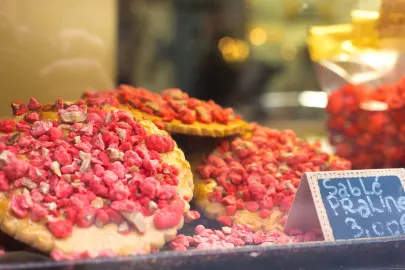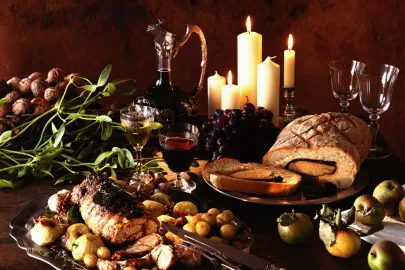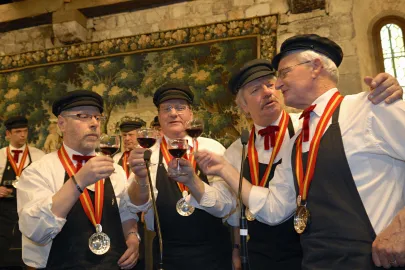Friends, fireworks, and copious amounts of food—sounds like the perfect Bastille Day to us! However, while you’ve likely heard of (and celebrated) Bastille Day before, do you actually know the history behind this famous French holiday? For starters, the famed day’s background is probably a bit more complex than you think. But don't worry, we’ve got it all condensed down in this five-minute, easy-to-skim read.

What Is Bastille Day?
Bastille Day is the English name for France’s national celebration, which commemorates the Storming of the Bastille on July 14th, 1789, as well as the unity of the French population the following year.
What Is the History Behind Bastille Day?
By the late 18th century, France was greatly divided between the reformist and conservative parties, as well as undergoing a severe economic crisis. When the finance minister under Louis XVI—who sided with members of the Third Estate who were in the midst of writing a constitution—was fired, the Parisian population was furious. Groups began to take matters into their own hands, even breaking into the Hôtel des Invalides to steal weapons, so as to revolt against the corrupt leadership.
On the same day, a group of people also stormed the Bastille, which at the time was used as a jail for prisoners whose crimes couldn’t be appealed—and who were often incarcerated for no reason. The Bastille fortress represented the oppressive reign of Louis XVI, a symbol of social injustice and inequality.
At the time, only seven inmates were being held captive, but their release by the people storming the jail made waves across the world. According to France’s official government website, the storming of the Bastille “signaled the first victory of the people of Paris against a symbol of the "Ancien Régime" (Old Regime).”
That same year (1789), plans were already being made for a national holiday to commemorate the victorious uproar and unity of the French people. The first Fête de la Fédération, a celebration of the great insurrection, was held on the same day the following year (July 14th, 1790), and included fireworks, wine, and a four-day feast.

© mikroman6
When Did Bastille Day Become Official?
Although Bastille Day was celebrated almost immediately after the storming of the Bastille (and for years to follow), the holiday was not made official until over a century later on July 6th, 1880. In May of that year, Benjamin Raspail proposed to revive the celebrations and make Bastille Day an official holiday. He faced some logistical hurdles though —under French law at that time, the storming of the Bastille was still technically illegal.
However, politicians agreed that the holiday would be based on a dual honoring of the Fête de la Fédération, as well as the storming of the Bastille, rather than the acts of violence. 1880 also marked the first year of the military parade on Bastille Day, which has been held in Paris every year since (with the exception of 1940-1944 due to World War II and 2020 due to the COVID pandemic).
What Are Other Names for Bastille Day?
In French, Bastille Day is called the “Fête nationale du 14 juillet”, or simply “le quatorze juillet” (July 14th).
How Is Bastille Day Celebrated in France?
Bastille Day celebrations are held all over France, though the most famous commemoration is the annual military parade, which takes place in Paris on the Champs-Elysées. Parties featuring live music, dancing, and large amounts of food and wine can be found all across the country, as well as festive firework displays.
How to wish Happy Bastille Day in France?
The French don’t call it « Bastille Day » but rather « le quatorze juillet », so a traditional greeting would be « Joyeux quatorze juillet! ».
Does the French Bastille still exist?
Tourists visiting Paris are often disappointed to learn that the Bastille fortress no longer exists. In fact, it's demolition began the day after it was stormed.
Today the site where the Bastille stood is commemorated by the Place de la Bastille, a monument and a public square, to remind people of the events that led to the birth of the French Republic.
Is Bastille Day Celebrated in Other Countries?
Yes! Many countries around the world, particularly those with ties to France, celebrate Bastille Day. For example, the Belgian city of Liège has celebrated Bastille Day for nearly 100 years, commemorating the special day with a dance festival and fireworks. In Canada, notable celebrations take place in Vancouver and Toronto. Within Europe, firework shows take place at Tivoli in Copenhagen, as well as on the banks of the Danube in Budapest. French-focused food festivals also occur in Prague, Dublin, and a number of other European cities. Elsewhere across the world, noteworthy celebrations take place in India, New Zealand, South Africa, and the United States.
Add a French Touch to Your At-Home Bastille Day Celebration
It’s no secret that the French love food and wine—and Bastille Day picnics are the perfect excuse to indulge. From Provençal rosé to favorite French cheeses, adding a touch of French flare to your at-home Bastille Day celebration is as easy as grabbing a French staple product at your local grocery store. For those who are more ambitious in the kitchen, check out a few of our favorite French-inspired summer recipes, here:
Other Classic French Recipes To Celebrate Bastille Day
Need some more French recipe ideas for your Bastille Day party? We’ve got you covered! From simple finger food like Quiche Lorraine or Croque-Monsieurs to more elaborate recipes like Boeuf Bourguignon and Buckwheat Gougères with Comté Sauce, you'll be sure to delight your guests with these French Classics!
Where to Celebrate Bastille Day in the USA:
Many major US cities partake in some form of official Bastille Day celebrations, with smaller restaurants, wine bars, and markets hosting one-off festivities all across the nation. Head to the following celebrations below or reach out to French establishments in your neighborhood to see what they’ve got in store!
New York - Upper East Side - Street festival hosted by the Alliance Française on 60th Street between Madison and Fifth Avenues; street festival on Smith Street in Brooklyn
Baltimore - Annual celebration at Petit Louis (Roland Park)
Boston - Street festival in Back Bay (near Cultural Center)
Newport, Rhode Island - Celebration at King Park
Washington D.C. - Food festivals, music, and auctions hosted by the French Embassy
Dallas - Bastille on Bishop (Bishop Arts District in North Oak Cliff)
Austin - Bastille Day party at the French Legation
Miami - Annual celebration, location changes every year
New Orleans - Numerous celebrations across the French Quarter area
Chicago - Celebrations at Navy Pier and Oz Park
Milwaukee - Four-day street festival including a re-enactment of the storming of the Bastille
St. Louis - Numerous festivals, most notably within the Soulard neighborhood (including a parade, fake beheading, and walking / golf cart parade)
Portland - Festivals coordinated by the Alliance Française across numerous parks
Seattle - Picnics, wine-focused events, and shopping at the Seattle Center
From our Taste France Magazine family to yours, we wish you a bonne fête nationale!
Contributor

Editor
















